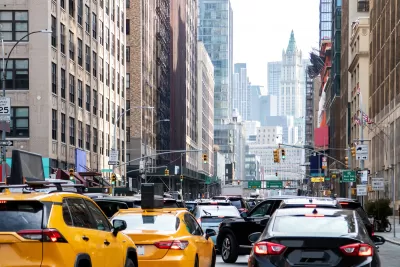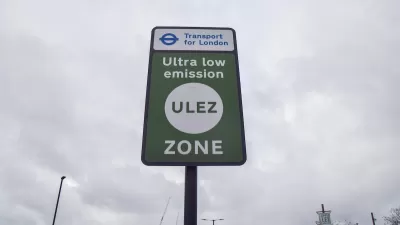Advocates of the program are calling on Gov. Hochul to reinstate the program in light of the decision.

In the ongoing saga of New York City’s beleaguered congestion pricing program, a federal judge ruled against a lawsuit challenging the program, throwing Governor Kathy Hochul’s decision to suspend it into further question.
As Gersh Kuntzman explains in Streetsblog NYC, the lawsuit accused the MTA of violating the National Environmental Policy Act. The judge disagreed, saying that the MTA conducted a “meticulous” 45,000-page analysis of the program’s potential impacts.
Kuntzman outlines the judge’s point-by-point refutation of the plaintiffs’ arguments. “Liman's 113-page opinion dealt mostly with jurisdictional claims and whether plaintiffs had sued the right people or whether they had standing in the first place. But it also included a clear lack of patience for most of the plaintiffs' arguments, such as the contention that congestion pricing was such a significant change that its magnitude alone required a formal environmental impact statement instead of the supposedly less-rigorous environmental assessment.”
Commenting on the decision, Riders Alliance Executive Director Betsy Plum said, “Now that a federal court has upheld the MTA's exhaustive environmental review, our governor should feel comfortable with moving forward and delivering the program's benefits.”
A ruling in a separate case brought by the state of New Jersey is still pending.
FULL STORY: Federal Judge Sets Aside a Key Congestion Pricing Lawsuit

Manufactured Crisis: Losing the Nation’s Largest Source of Unsubsidized Affordable Housing
Manufactured housing communities have long been an affordable housing option for millions of people living in the U.S., but that affordability is disappearing rapidly. How did we get here?

Americans May Be Stuck — But Why?
Americans are moving a lot less than they once did, and that is a problem. While Yoni Applebaum, in his highly-publicized article Stuck, gets the reasons badly wrong, it's still important to ask: why are we moving so much less than before?

Research Shows More Roads = More Driving
A national study shows, once again, that increasing road supply induces additional vehicle travel, particularly over the long run.

Which US Rail Agencies Are Buying Zero-Emissions Trains?
U.S. rail agencies are slowly making the shift to zero-emissions trains, which can travel longer distances without refueling and reduce air pollution.

San Diego School District Approves Affordable Housing Plan
The district plans to build workforce housing for 10 percent of its employees in the next decade and explore other ways to contribute to housing development.

Lawsuit Aims to Stop NYC’s ‘City of Yes’ Zoning Reforms
A lawsuit brought by local lawmakers and community groups claims the plan failed to conduct a comprehensive environmental review.
Urban Design for Planners 1: Software Tools
This six-course series explores essential urban design concepts using open source software and equips planners with the tools they need to participate fully in the urban design process.
Planning for Universal Design
Learn the tools for implementing Universal Design in planning regulations.
City of Moreno Valley
Institute for Housing and Urban Development Studies (IHS)
City of Grandview
Harvard GSD Executive Education
NYU Wagner Graduate School of Public Service
City of Cambridge, Maryland
Newport County Development Council: Connect Greater Newport





























